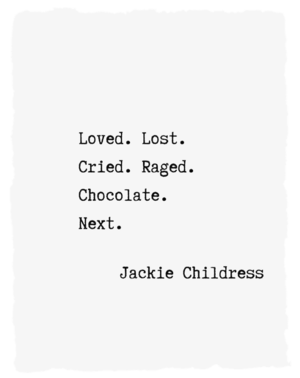Using Poetry to Heal
By now, it’s no surprise that I deeply believe in the power of writing and healing. But I’ll be honest, I had my doubts about what poetry could do. Mostly because as an English major, the poetry I was required to read and analyze were the “classics” (aka, poetry written by old, white, privileged men). Yes, we were exposed to the female “classics” as well, but I could not relate or understand what was so great about poetry. To me, it felt boring and snobbish and confusing.
from Six-Word Memoirs on Love & Heartbreak by Writers Famous & Obscure
But I realized that poetry is so much more than those boring, stuffy black and white poems I read in college. I had to find the type of poetry that resonated with me, my style and my way of analyzing in order to fully comprehend the power of it. And once I did, I fell in love with poetry!
Your mission after reading this article? Go explore and find a style of poetry that resonates with you. Maybe you will like the classics! Maybe acrostic poetry is your jam. I honestly don’t care what style of poetry you like — just that you find something you like.
Because once you find a style of poetry that you resonate with, the power of the words become evident.
What appeals to me most about the poetry that I love is the sparseness of the actual words but the vastness of the meaning. I’ve always been a “lean” writer. And I’m forever tasked with “fleshing out” part of my writing rather than deleting or removing extraneous sections.
Poetry falls perfectly into the category of “less is more” and I’m fascinated by poets who can take 20 words or less and build a heart-achingly beautiful story. That is a gift.
For me, what makes poetry such a great form of expressive writing to heal is the ability to be as straight-forward as you like or as subtle and hidden. Take for example this six-word memoir poem by Jackie Childress (featured in Six-Word Memoirs on Love & Heartbreak by Writers Famous & Obscure). The words are pretty straight forward. But the way I read it will be different from the way you read it, which will be different from how another person reads it. For me, I get a sense of matter-of-factness and clarity from the poet. Like, yes, this is what happened, but I’m ready to move on.
And then, there are the less straight-forward poems that require your brain to find the meaning and connect the dots. These are especially great for healing, in my opinion, because you can take away SO MANY THINGS from one poem. And if you’re anything like me, you may even find the poem holds different meanings for you at different times. This poem by Christopher Poindexter is one of my absolute favorites — but the meaning behind the words has changed for me over the years.
The first time I read it, I related to it in a macabre way. I attached the “wolves” in the poem to my anger and the grip I had on it. I knew at the point in my life that holding onto anger and resentment wasn’t healthy, but I didn’t care. It was all I had in that moment in time — so for me, I related to the fact that I knew I was sleeping with the “wolf of anger” and it might eat me whole one day but I loved holding onto it because it meant that I was alive.
A few years later, when I was in the thick of starting a new business and attempting to “find myself,” I would look at that poem and often think that the “wolves” weren’t my anger… but rather my desire to follow my dreams. I believed that the world was inherently against creatives and it was a struggle every day not to “sell out” or conform. I thought myself a wolf while other people trying to tear me down were the sheep. And what do wolves do to sheep?
Yeah.
I was consumed with “proving them wrong” that by the time I burned out and fell into another depression, I realized I had forgotten about the last part of the poem. I literally loved my wolves so deeply, it was killing me.
My current view on the poem actually hasn’t changed that much, but rather than resonating with the words, I use it as a reminder. That when we hold too tightly to our “wolves,” we run the risk of it consuming us whole. Killing the very thing we love.
Poetry, for me, sparks a visceral reaction in me that many other forms of writing can’t do. Perhaps it’s because of how sparse the words are, or how beautifully arranged they can be. I don’t know the answer, just that I respect and adore poetry for giving me that experience. I have found myself between the pages of many a poetry book and have been able to see the growth of my own healing in the way I interpret and resonate with certain ones.
One of my absolute favorite poets, Amanda Lovelace, spoke about poetry and healing and I loved what she had to say about the two. Read the article by clicking here.
So I’ll leave you with one of my all-time favorites from Amanda Lovelace’s the princess saves herself in this one.
my sister & i
spent our nights
wishing upon
the plastic
glow-in-the-dark
stars
plastered to our
ceiling.
- we made it after all.
• • •


